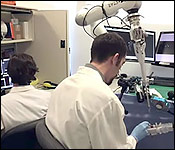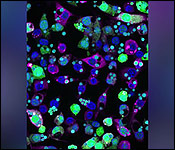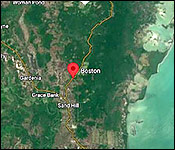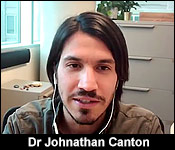


Dr Johnathan Canton was born and raised in Boston Village, Belize, but today, he’s a scientist and professor at the University of Calgary in Canada. And this afternoon, Dr Canton’s groundbreaking research was today published in a prestigious journal called “Science Immunology.”
His findings reveal new ways to harness the body’s immune system to target cancer cells more effectively. Talking to us from Calgary, Dr Canton told us more about his research via Zoom. Courtney Menzies has this story.
A Belizean scientist and professor at the University of Calgary in Canada has made a breakthrough in cancer research and today, his article was published in the Science Immunology Journal.
Dr Johnathan Canton told us via Zoom that his research may change the way immunotherapy for cancer is treated:
Dr Johnathan Canton, Professor, University of Calgary
“What we found in a nutshell is that a specific type of cell in our body, an immune cell called a dendritic cell, can sample either virus material or material from tumor cells and process it in a way that generates an immune response that can go on to kill the tumors. Now, what we found was the specific mechanism by which dendritic cells actually process material, and that has been very hotly contested and debated in the field. And so that’s why quite a few people are very excited about this discovery, because we can leverage this information to design better vaccines and better therapies for cancer.”
And Dr Canton says that this breakthrough in his research – and his career in science – is largely due to his life in Belize.

Dr Johnathan Canton, Professor, University of Calgary
“I credit it to the time that I spent in Belize. I described to you before the interview that I spent two years, in Belize, farming. And I think what happens, I mentioned to you that these sorts of things can remain mysteries for decades. And I think what happens is, as scientists, we get so locked into the nitty gritty, the very fine details of the work that we do. And I often say to the students in my lab that that little break that I took where I could go home and plant my papaya and cocoa and all that kind of stuff, pulled me out of that world and got me to think more broadly. And so at the at the time I went, when I left Belize in 2018 to do a postdoc, I found that, I was more sort of open to novel ideas. And that was the first step in the and the process of this discovery.”
“I grew up in a in a place called Boston Village in Belize. It’s kind of far removed from the city. It was still a very small village. It is still a very small village these days. And I think that’s where my interest in biology really was developed. You know, when I was growing up in Boston, you know, my nearest neighbor was a few miles away. So you didn’t get to see that many people. So I spent my early days immersed in a very natural setting. And you engage with biology on a daily basis, right? So for me, I think it all came sort of from those roots growing up in Boston Village and I still credit most of my interest in my career in biology with that setting.”
And while his interest for biology began in Boston Village, Dr Canton says he wasn’t interested in cancer research until he heard the experiences of cancer survivors and decided that he wanted help to enhance treatments for the disease.
And though the results of this research likely won’t have a physical impact on patients within this decade, he explained that he hopes to bring it back to Belize.
Dr Johnathan Canton, Professor, University of Calgary
“The discovery I made, we would perhaps class it as what they call fundamental or basic science, which is purely the theory behind how these things work. And then the next step, if there’s the potential to leverage a discovery like this for a therapy, the next step would be what’s called a pre-clinical model. So you take your idea to a preclinical model, which is often, an animal model of cancers. And you can test your idea and those preclinical models. And then the third step is you then work towards trials in people. You need a pipeline for that to work. And I’m very fortunate to be situated in a hospital that has exactly those pipelines. And we can we can move forward with those. I have to say, on a personal note, one of my goals at the moment is to bring this type of biotechnology research home to Belize.”
“And so I can tell you that this discovery has allowed me now to write new grants, because all research is funded through grants, to write new grants that focus on immunotherapy. And so I think that, in terms of changing the course of how things are treated, I’ve got perhaps three grant applications in each of them have different angles of how we can spin this discovery for novel approaches to Immunotherapeutics.”
For now, his team’s research is available, but not easily accessible:
Dr Johnathan Canton, Professor, University of Calgary
“So they have what’s called a, like a paywall, I guess you could, you could call it. And so, you know, it’s very expensive to get these articles down and a lot of people can’t afford to access them. We attempted to publish open access, but unfortunately for this particular journal, they don’t do open access. But what we can do is we do make the article available to anyone that’s interested in it. It’s just a personal request to to me, for example. And I can send I can send an informal copy of the article to individuals. And so today it came out about an hour ago, and I’ve already received a number of requests for that article. And then I will send it out to those individuals. So really, unless your institution has access to it, it’s very difficult to read, which is very sad. Because somebody, let’s say somebody at UB wants to read this article, they can’t just pull that off of the website, which is unfortunate, but, I would be more than happy to share that with anyone that wants to read it.”
Those students wanting to reach out to Dr Canton about his research can email him at [email protected].
This post was originally published on here





